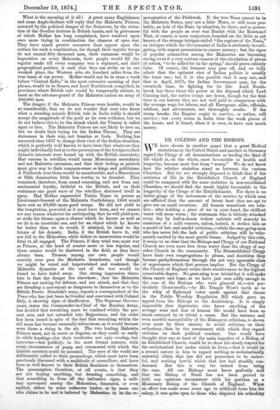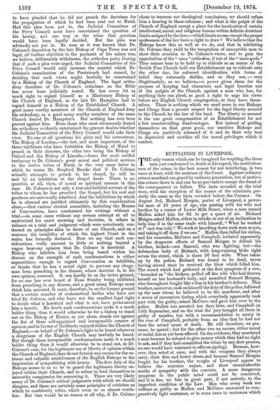DR. ciorxxso AND THE BISHOPS.
have shown in another paper that a great Medical statistician in the United States and another in Germany regard the Clergy of all denominations as leading the kind of life which is, on the whole, most favourable to health and longevity, because most free from " worry." We do not know how the relative statistics stand as between the various Churches. But we are strongly disposed to think that if the statistics of life in the Established Church of England could be compared with the same statistics in non-established Churches, we should find the result highly favourable to the longevity of the Clergy of the Establishment. For there is no better gauge of the seriousness of the worries by which men are afflicted than the amount of latent heat they are apt to give out on small occasions. All human sensations are rela- tive ; after holding a piece of ice in your hand, the chilliest water will seem warm ; the statesman who is bitterly attacked every day by half-a-dozen violent satirists will scarcely be conscious of a mild censure, unless, indeed, it strikes him as a model of fair and candid criticism,—while the easy-going man who has never felt the lash of public criticism will be vehe- mently excited by the most gentle blame. Judged by this rule, it seems to us clear that the Bishops and Clergy of our National Church are even more free from worry than the clergy of any other Church in the community. The Disestablished Clergy have their own congregations to please, and doubtless they become pachydermatous through the not very agreeable class of experiences which that process implies. But the Clergy of the Church of England retain their sensitiveness to the highest conceivable degree. No gnat-sting is so trivial but it will make them smart and fume, as we have just seen oddly enough in the ease of the Bishops who were glanced at,—not par- ticularly ill-naturedly,—by Mr. Temple West's myth as to the whip of Episcopal votes made against that clause in the Public Worship Regulation Bill which gave an• appeal from the Bishops to the Archbishop. It is simply impossible that dignitaries who know anything of the average wear and tear of human life would have been so much annoyed by so trivial a cause. But the extreme and even morbid susceptibility of the Bishops to criticism, is shown even more by their anxiety to avoid criticism on their orthodoxy, than by the resentment with which they regard criticism on their political conduct. One would have thought that one at least of the main impulses of a Bishop of an Established Church, would be to show his steady respect for the ecclesiastical law under which he lives,—that it would be a second nature in him to regard nothing as ecclesiastically unlawful which that law did not pronounce to be unlaw- ful, and nothing lawful which that law had steadily con- demned. But this is very far indeed from being the case. All our Bishops must know perfectly well that the Bishop of Natal has not been proved to hold any opinions inconsistent with his position as a Missionary Bishop of the Church of England. When an effort was made some years ago to withhold from him his salary, it was quite open to those who disputed his orthodoxy
to have pleaded that he did not preach the doctrines for the propagation of which he had been sent out to Natal. Had this plea been put in, the Judicial Committee of the Privy Council must have entertained the question of his heresy, and one way or the other that question would have been legally decided. But the plea was advisedly not put in. So soon as it was known that Dr. Colenso's deposition by the late Bishop of Cape Town was not legal, all further objection to the payment of his salary was, we believe, deliberately withdrawn, the orthodox party fearing that if such a plea were urged, the Judicial Committee of the Privy Council would only increase the scandal which Dr. Colenso's examination of the Pentateuch had caused, by deciding that such views might lawfully be entertained by a Bishop of the Church of England. The legal ortho- doxy therefore of Dr. Colenso's criticisms on the Bible has never been judicially tested. He has every bit as much right to regard himself as a Missionary Bishop of the Church of England, as the late Dr. Hampden had to regard himself as a Bishop of the Established Church. A good many worthy members of the Church of England deny his orthodoxy, as a good many worthy members of the same Church denied Dr. Hampden's. But nothing has ever been proved against him. Even those who most strenuously denied his orthodoxy evidently entertained the gravest doubts whether the Judicial Committee of the Privy Council would take their view. No one at all questions his piety and his earnestness. The Bishop of London,—the last, and most important, of the three inhibitors who have forbidden the Bishop of Natal to preach in their dioceses, the other two being the Bishop of Oxford and the Bishop of Lincoln,—bears the most cordial testimony to Dr. Colenso's great moral and political services to the native tribes of Natal, in the very same letter in which he warns Mr. Stopford Brooke that if Dr. Colenso actually attempts to preach in his chapel, he will be met by an inhibition at the chapel doors. There is no question at all, then, of moral or spiritual censure in this case. Dr. Colenso is not only a true and faithful servant of the tribes to whom he has preached the Gospel,.but his zeal and goodness are universally admitted. And the inhibitions by which he is silenced are justified ultimately by this consideration alone,—that various clerical assemblies, including the Houses of Convocation, have condemned his writings without a trial,—in some cases without any serious attempt at all to understand his exact meaning and doctrine, in others in reliance on a trial and judgment which were notoriously con- ducted on principles alien to those of our Church, and on a sentence the invalidity of which the highest Court in the realm has formally declared. Now we say that such con- siderations really amount to little or nothing beyond a vague hear-say opinion that Dr. Colenso is heretical. A Bishop who inhibits him from being heard within his diocese on the strength of such condemnations is either superstitious enough to regard Convocation as infallible, or thinks that he has a moral right to prevent any clergy- man from preaching in his diocese, whose doctrine is, in his own opinion, unsound. It can hardly be on the latter ground, for no one has ever heard of Dean Stanley being inhibited from preaching in any diocese, and a great many Bishops must think him unsound. It must, therefore, be on the former ground that a certain number of ecclesiastical bodies who have not tried Dr. Colenso, and who have not the smallest legal right to decide what is heretical and what is not, have pronounced him a heretic. No doubt such condemnations make it a much bolder thing than it would otherwise be for a bishop to stand out as the Bishop of Exeter, as yet alone, stands out against the fiat of these self-appointed and irresponsible censors of opinion, and in favour of the liberty enjoyed within the Church of England,—on behalf of Dr. Colenso's right to be heard wherever a clergyman of the English Church may lawfully be heard. But though these irresponsible condemnations make it a much bolder thing than it would otherwise be to stand out, in Dr. Colenso's case, for the legitimate use of liberty of opinion within the Church of England, they do not furnish any excuse for the ex- treme and culpable sensitiveness of the English Bishops to the imputation of sympathising with heresy. The first duty of the Bishops seems to us to be to guard the legitimate liberty en- joyed within their Church, and to refuse to lend themselves to unworthy conspiracies for narrowing it. There are very likely many of Dr. Colenso's critical judgments with which we should disagree, and there are certainly some principles of criticism on which he confidently relies, which seem to us almost worth- less. But that would be no reason at all why, if Dr. Coleus() chose to traverse our theological conclusions, we should refuse him a hearing in these columns ; and what is the pulpit of the Church of England except a place for the inculcation of certain intellectual, moral, and religious lessons within definite doctrinal limits assigned by the law,—which limits no one except the proper spokesmen of the law have a right to draw ? We believe that the Bishops know this as well as we do, and that in inhibiting Dr. Colenso they yield to the temptation of susceptible men to show their aversion to Dr. Colenso's views, and to gain the approbation of the " unto "-orthodox, if not of the " unto-gude." They cannot bear to be held up to ridicule as an orator of the Scotch Free Church held our Establishment up to ridicule only the other day, for enforced identification with forms of belief they extremely dislike, and so they use, — very illegitimately, as we believe,—a power given them for the purpose of keeping bad characters and legal heretics out of the pulpits of the Church, against a man who has,- for anything they can plead, as good a right to urge his views before any English Church congregation, as they have them- selves. There is nothing which we need more in our Bishops and Clergy than a greater respect for the legal liberty secured to the Church by the law of the land. The liberty so secured is the one .great compensation of an Establishment for not a few countervailing disadvantages. But instead of priding themselves on that great good, our sensitive Bishops and Clergy are positively ashamed of it and do their very best to depreciate and sacrifice all the moral privileges which it confers.







































 Previous page
Previous page